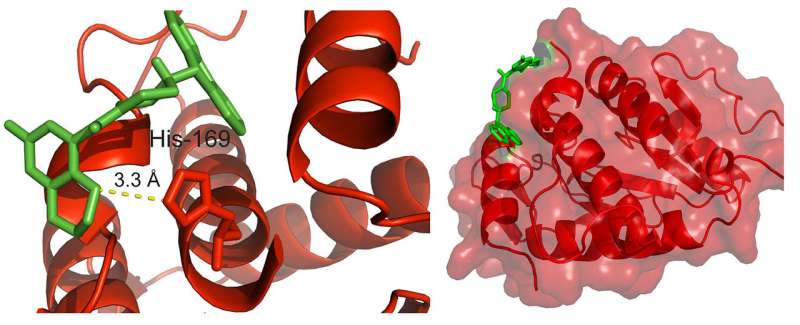This image shows two poses for a new compound, discovered at Purdue University, docking and targeting the laminin receptor protein for cancer therapy. Credit: Purdue University
Purdue University researchers are studying ways to make prostate cancer, ranked as the second most common and second most fatal cancer among men by the American Cancer Society, less lethal by making it less aggressive.
The Purdue team has developed a drug to target the laminin receptor (37/67 LR), a membrane protein that when overexpressed can promote the growth of cancer cells and tumors. The researchers say it also could help fight other types of aggressive cancers, including pancreatic, colon, liver and breast.
"We are trying to take cancer's foot off the accelerator by targeting this receptor," said Marxa Figueiredo, a Purdue associate professor of basic medical sciences, who helped lead the research team.
Purdue's drug binds to the laminin receptor and cuts its ability to help tumors grow and to communicate with blood vessels, which are the lifeblood for cancer cells and tumors. The Purdue compound mimics anti-proliferative and anti-angiogenesis pathways to inhibit cancer cell viability, proliferation, migration, as well as inhibits the formation of new blood vessels.
The Purdue approach is unique because it provides a single drug to perform multiple functions in cancer treatment. The drug also shows promise for treating similar cancers in pets.
"It is incredibly rewarding and exciting to potentially provide new options for people and for animals dealing with aggressive tumors," Figueiredo said.
Figueiredo worked with her former graduate student, Sam Umbaugh, to develop this drug. She is currently collaborating with Herman Sintim, Purdue's Drug Discovery Professor of Chemistry, to create different versions of the drug that are more effective against various types of cancers.
Provided by Purdue University























